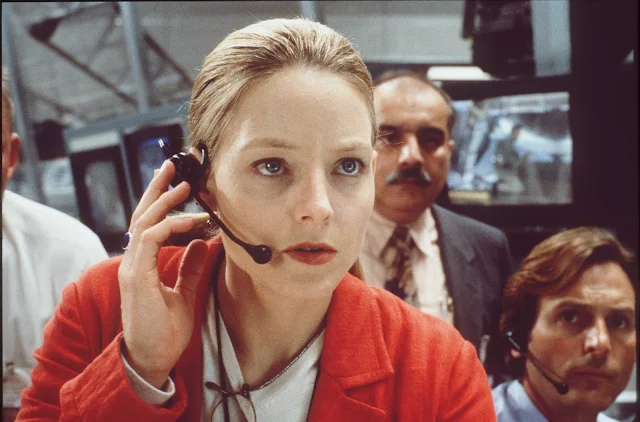In this discussion, we will delve into four primary themes that form the backbone of "Contact": Science vs. Faith, Human Isolation, Ethical Implications of Discovery, and the Nature of First Contact.
Science vs. Faith theme in Contact
The Representation of Science and Faith through Characters
In "Contact," Ellie Arroway, portrayed by Jodie Foster, is the embodiment of science—rational, evidence-based, and driven by an unyielding quest for knowledge. On the other end of the spectrum stands Palmer Joss, played by Matthew McConaughey, a theologian who represents the essence of faith—mysterious, spiritual, and driven by a need to understand the universe's greater meaning. The characters serve as symbolic stand-ins for these competing viewpoints, clashing and intersecting throughout the narrative.
Dramatic Moments That Highlight the Conflict
One scene that poignantly highlights this tension is Ellie's testimony before the Congressional committee. Ellie is questioned about her experience and is asked to provide empirical evidence. Palmer Joss joins in, asking her if she could prove that her deceased father ever loved her. The moment brings the perennial tension between empirical evidence and personal experience into sharp focus.
Complexities and Overlaps
While the characters seem to represent polar viewpoints, the narrative intricately lays out instances where science and faith overlap. For instance, Ellie's use of the phrase "for Carl," before embarking on her journey, implies a near-religious reverence for her mentor, Carl Sagan. Conversely, Palmer Joss's faith does not necessarily negate his interest in scientific discourse. These complexities enhance the narrative richness, challenging any attempt to pigeonhole science and faith into neat, mutually exclusive categories.
Human Isolation and the Search for Connection
Ellie's Journey: A Path of Loneliness
Ellie's character arc transcends the boundaries of a mere scientific quest; it is also a deep, emotional journey toward connection. From losing her father at a young age to experiencing a lack of true companionship in her adult life, her pilgrimage to the stars is as much about filling the emptiness within her as it is about answering questions about extraterrestrial life.
 |
| Jodie Foster as Ellie in Contact |
Cinematic Techniques to Convey Isolation
Zemeckis masterfully uses cinematic techniques to underscore the theme of human isolation. Shots of Ellie engulfed by the enormity of the Arecibo telescope or dwarfed by the vastness of space serve to amplify her solitude. The visual language of the film paints a poignant picture of isolation, both physically and existentially.
The Universal Experience of Loneliness
Ellie’s isolation and quest for connection reach beyond her individual experience, tapping into the universal human condition. This is emphasized by her final communication with the alien civilization, where it's hinted that the experience of loneliness and the longing for connection are shared across sentient beings.
Ethical Implications of Discovery
The Cost of Curiosity
"Contact" delves into the moral and ethical quandaries that accompany the pursuit of knowledge. The construction of the machine, based on alien blueprints, costs trillions of dollars and comes at the cost of potential global unrest, underscoring that the path to discovery is fraught with societal ramifications.
Decisions and Dilemmas
The ethical dilemmas in "Contact" extend from individual to global scales. The selection of Ellie as the traveler, for example, comes with its own ethical baggage, raising questions about who gets to represent humanity.
Broader Social and Ethical Questions
The ethical dilemmas presented in the film are not confined to its narrative but are reflective of broader concerns in science and technology, such as resource allocation, the prioritization of scientific endeavors over pressing social issues, and the ethical responsibility that comes with groundbreaking discoveries.
The Nature of First Contact
Re-Defining the Trope
"Contact" distinguishes itself by offering a fresh perspective on the well-trodden sci-fi trope of first contact. Instead of an invasion scenario or a physical arrival, the film explores first contact through signals, mathematics, and a singular transcendental experience.
Psychological and Philosophical Aspects
The movie’s treatment of first contact is not merely an exploration of humanity's place in the universe, but also an introspective look into the human psyche. It postulates that encountering extraterrestrial intelligence challenges not just our scientific understanding, but our philosophical and ethical beliefs.
Influence on Later Science Fiction Works
The nuanced approach to first contact in "Contact" has left its mark on later works in the science fiction genre. Movies like "Arrival" (2016) and books like "Anathem" by Neal Stephenson draw on these themes, incorporating the complexities of communication, understanding, and the broad implications for humanity in their narratives.
Conclusion as to the themes of Contact
Through an intricate tapestry of narrative, character development, and visual storytelling, "Contact" serves as an intellectual odyssey, probing into some of the most enduring questions that concern humanity. The film's exploration of Science vs. Faith, Human Isolation, Ethical Implications of Discovery, and the Nature of First Contact makes it a seminal work, inviting viewers not just to look outward into the cosmos, but also inward into the complexities of the human condition.















